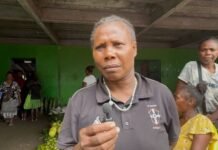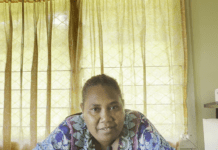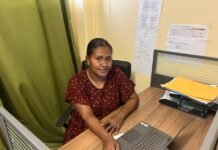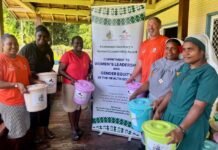
FOR Solomon Airlines, the national airline of Solomon Islands, it was a launch of a different kind.
It was not about a new flight to an exciting destination. The launch still though did spark a sense of anticipation among the airline’s employees, as the company broke new ground by introducing an innovative new policy on violence, as part of measures to build a more respectful and supportive workplace.
It’s a significant move by an employer in the Pacific, a region where two out of every three women are affected by violence.
The company’s Assistant Manager for Human Resources, Hernandia Zoleveke, said the policy started to have an impact almost immediately. “We now have more employees coming forward and disclosing incidents of violence and we are much better equipped to support them by providing constructive advice,” she said. “As a result, the affected employees can carry on with their jobs with the minimum possible impact on their lives and their productivity.
Zoleveke said previously employees would have hesitated to come forward and so the company would not have known what was affecting their performance or ability to come to work. “We may have even terminated their employment and incurred associated re-recruitment costs.”
The policy, which was developed with IFC’s support, defines what constitutes domestic violence, specifies the responsibilities of the company towards preventing it or addressing it, sets clear procedures for reporting and investigating, and identifies remedial actions and support measures. A similar policy, implemented by SolTuna, Solomon Islands’ only tuna processor and the largest employer of women in the country, is contributing to a reduction in absenteeism.
Why is this important? According to a new IFC survey in Solomon Islands, more than 70% of employees in nine large companies said that violence affected their workplace while more than 80% said that employers should help affected staff.
It’s the reason why a group of 15 companies in Solomon Islands have joined the Waka Mere Commitment to Action initiative to promote gender equality in the workplace, including by supporting employees affected by domestic violence. The initiative is led by IFC and the Solomon Islands Chamber of Commerce and Industry (SICCI), with support from the governments of Australia and New Zealand.
Through Waka Mere, employers are increasingly recognizing the business case for taking action to address violence in the workplace. Manasseh Taloafiri, Human Resources Manager at Solomon Islands National Provident Fund notes that “domestic violence takes a toll on people’s lives – both at home and at work.” Suresh Amarasekera, CEO at Pan Oceanic Bank said they recognized “the business value of systematically addressing domestic violence in the workplace” while Janet Inito, Human Resources Manager at Hatanga Construction said that “offering constructive support to employees affected by violence shows we care and builds their loyalty to our company.”
According to Ian Gooden, General Manager at Solomon Islands Water Authority, one of the biggest challenges in addressing violence in the workplace was getting staff to recognize the value of speaking up. He said demonstrating that the company was there to support them and having a team of trained responders on standby to provide confidential and constructive support has been critical to the effort.
Bank South Pacific (BSP), one of the largest banks in Solomon Islands, offered awareness-raising sessions on violence to all staff across the country as part of a corporate policy on violence. They also trained a team of first responders. Their objective was to get employees to disclose incidents of violence, offer them structured support, and allow them to carry on with their jobs. According to Freda Fa’aitoa, Human Resources Manager at BSP, in just one year, the company recouped the costs of implementing the policy and saved two jobs of employees affected by violence. Previously, unaware of what was really happening to the employees, they would have terminated their employment for being absent without cause.
Creating a conducive environment for employees affected by violence to speak up, knowing they will receive constructive support has ripple effects. “Being a victim of violence myself, I know being open about violence helps affected employees keep their jobs and, ultimately, it also helps the bottom line of companies,” said Grace Campbell, Human Resources Manager at SolBrew in Solomon Islands.
In a nutshell, as Amy Luinstra, IFC’s Gender Program Lead for East Asia and the Pacific puts it, “addressing violence in the workplace is a win-win for all -the employees, the companies, the economy- and employers have a key role to play as agents of change.”









































